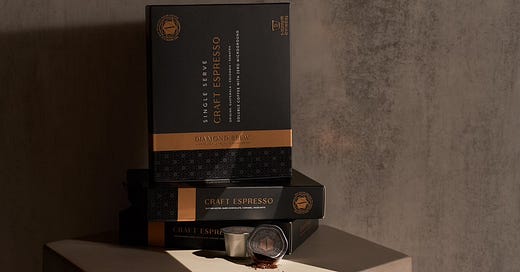Forbes Phenom Launches Diamond Brew
After years of interviewing CPG executives, journalist Douglas Yu knows a thing or two about how to brew up a recipe for success. Now, he’s putting those skills to work, launching coffee company Diamond Brew.
So read on to find out what’s the deal with this sparkly new brand and why investors (think GNC CEO Michael Costello) are already putting capital into the company.
A Diamond Experience
You’ve likely had Folgers instant crystals at some point in your life. Diamond Brew is decidedly not that. While the “carefully sourced” mix of coffee beans from Guatemala, Colombia, and Sumatra, are freeze-dried, the similarities to instant (aka soluble) coffee end there.
According to Yu, instant coffee is produced by “a spray-drying process that essentially evaporates coffee liquid with extremely hot dry air to create fine powder.” The result, he noted, is great when you’re in a time crunch, but ultimately leaves consumers with a cup of joe that’s less aromatic and flavorful, not to mention has lower caffeine levels.
While he won’t give all his secrets away, Yu said his manufacturer utilizes a “unique process” for Diamond Brew, which results in a cup of coffee with a nuanced flavor profile. A Diamond Brew espresso shot, he said, tastes and looks freshly brewed, complete with a white crema on top.
Sounds fancy right? While Diamond Crystal Brew has an MSRP of $29.88 for 12 capsules, Yu noted that the price point is cheaper than heading to your local Starbucks (let alone La Colombe) for an Americano.
An Instant Facelift
Certainly there’s plenty of coffee companies. In craft instant alone we’ve got Alpine Start, Blue Bottle, Verve, Four Sigmatic, and many more. So why head into an established category?
According to Yu, during his initial research, several investors mentioned the appeal of powdered products, owing to the form factor’s shelf stability, lightweight shipping, and high margins. There are also plenty of existing manufacturing capabilities available, allowing for easier scalability. Wandering down grocery aisles brought about a “eureka” moment that he should focus on instant coffee, a category Yu said could “use a facelift” and offered him “enough room…to be a disruptor.” Plus, (shhh) Yu admitted, he grew up drinking Nescafe 3 In 1 Instant Coffee, so the product type holds a soft spot for him.
Further research revealed a gap in the market, he said. For most existing instant brands the focus is on convenience or functionality, rather than quality or taste. But by focusing on coffee first and foremost, with powder simply a delivery mechanism, Yu believes that he can cater to both coffee connoisseurs and the next generation of coffee drinkers.
“I have certainly noticed an increasing number of convenient coffee beverages powered by both emerging and legacy companies entering the market, from coffee concentrates to more premium instant coffee,” he told me. “This trend is largely driven by younger consumers, Gen Z in particular, who are more concerned with efficiency and customization.”
The Itch to Create
The biggest question I had for Yu was why on earth he’d want to start a food brand after seeing how challenging the endeavor could be. The answer: passion.
“The more I learn about these founders and executives over the years, the more I feel like I’m stuck in a rut – while it may take three hours for me to interview, transcribe, and write up a company announcement, it could take years for an entrepreneur to make that announcement possible,” Yu said. “That’s when I realized an elevated sense of purpose and fulfillment really comes from a long-term commitment to building something versus the instant satisfaction of seeing my byline on a daily basis.”
Still, Yu said his work as a journalist has been invaluable, offering the opportunity to determine what type of leader he wants to be and where he may face pitfalls.
“With market data and tools so readily available these days, it has become easier than ever to identify a white-space opportunity and come up with another ‘disruptor’ brand…certain founders [have an] overly mathematical approach to building a business,” Yu said. “I promised myself to ditch this playbook and build a new one by leveraging common sense as an everyday consumer, embracing uncertainties, and iterating continuously based on real feedback.”





